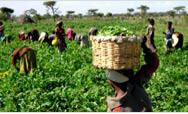You are here » Home » Telling Our Story
Case Study
Reforms help farmers compete in a glutted world marketplace
Reforms Help Small Coffee Growers

| |
Photo: Thomas Dixon TechnoServe
|
|
Farmers of the Leguruki Specialty Coffee Group hand-select "cherries" before processing at the group's central pulpery.
Poor farming practices and smallholders' inability to access specialty markets that would pay them higher prices for quality trapped growers in a vicious cycle of low prices, low yields, and ever-worsening production.
|
Challenge
Due to oversupply and static demand, coffee prices have steadily fallen since 1995, hurting small
coffee growers and national income from coffee exports. Of the 48,000 tons of coffee Tanzania produces
annually, 95 percent of it is grown by 400,000 small-scale farmers, and most is classified as
"fair average quality." While the coffee is of high value, government policies and practices at
the coffee auction result in farmers making lower profits than they should for their coffee.
A lack of income to invest in new tools or trees and inability to access specialty markets
that would pay higher prices for quality have trapped small growers in a vicious cycle of low prices,
low yields and ever-worsening production.
Initiative
In 2001, USAID began working with coffee growers in Tanzania's southern highlands to improve quality,
increase yields — and thus increase the prices farmers could demand. At the same time, a USAID-funded
study released in 2003 revealed that, compared to five "peer" producer countries, Tanzania has the
highest taxes on coffee producers and the lowest rate of reinvestment in the coffee industry.
The study led to a series of recommendations to reduce production costs and encourage investment,
including lowering tax rates and loosening license and permit requirements.
Results
USAID supported village-based central pulperies that enable smallholders to process their coffee
and achieve a better, more consistent product. For the 2003 season, these growers fetched prices
that were 55—65 percent higher than their neighbors. Acting on the recommendations of USAID's report,
the Tanzanian Finance Minister announced that local taxes and levies would be reset to boost rural
productivity, and local government licenses and permit fees would be reduced. These complementary
reforms will significantly reduce the "nuisance taxes" that currently plague small growers.
By addressing both the processing and regulatory issues that have hurt the coffee industry,
Tanzania has been able to gain access to specialty markets that pay higher prices — resulting
in increased incomes and employment for Tanzania's rural communities.
Print-friendly version of this page (40kb - PDF)
Click here for high-res photo
Back to Top ^ | 

